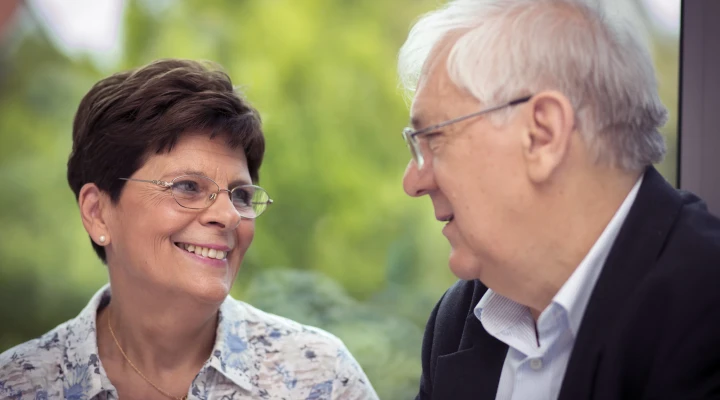Generally speaking, the best achievable result is to ensure the condition only stagnates (vision only improves in rare cases). Without treatment, there is a risk of complete loss of sight.
Eszter Kallós: In our previous conversation– when we analyzed the connection between our teenage children's over-eagerness for the digital world and deteriorating eyesight – we found out that Dr Regina Lukács, RMC's eye doctor, is a genuine specialist in macular degeneration. At that time, I promised I would ask her about this topic too, as it is an important thing to know about at my age. And what a good idea it was! It turned out that my age is not the only reason I should be pay attention to the high risks associated with this condition. But what is this strangely named disorder, exactly?
Dr Regina Lukács: Age-related macular degeneration is a condition affecting the macular, a yellow spot in the eye that helps makes your vision sharper. It typically occurs in people aged 50 and above. In developed countries, it is the leading cause of severe, irreversible deterioration in vision. The most important risk factors include age (its incidence triples from age 50 to age 75), skin color (it is more common in people with white skin), and genetic factors. Smoking is the most important behavioural risk factor.
EK: I've also heard that sunlight can also cause this kind of issue, which is why it's more common in people who work outside, and why it's a good idea to wear glasses that offer UV protection. Is this true?
RL: The various studies available have failed to identify a connection between exposure to sunlight and an increased risk of contracting age-related macular degeneration (AMD). However, UV radiation does increase the risk of developing other eye-related conditions, notably cataracts and various tumors.
EK: How can we detect the development of AMD?
RL: The main symptoms of macular degeneration are vision loss, dark spots or dots in your vision, and distortion (wavy or broken lines).
EK: Should I wait until I experience these symptoms? Or is it better to simply get a check-up once I turn 50?
RL: Even if you don't have any symptoms, it's best to attend an eye examination on a regular basis. If you don't have any risk factors, aged 40-54 years you should have an eye exam every 2-4 years, between 45-64 years every 1-3 years, and from the age of 65 every 1-2 years. Returning to the progression of the disease: We can distinguish three stages of macular degeneration: early, intermediate (moderate), and advanced. There are two main types of advanced macular degeneration. In the case of the 'dry' type (approximately 20% of cases with visual impairment), the reason for visual impairment is atrophy of the center of your vision. In the case of the 'wet' type (about 80% of cases with impaired vision) abnormal blood vessels form, which are accompanied by the development of edema (swelling). This process eventually leads to scarring, and the impairment of vision occurs at a faster rate with this form. Diagnosis may require additional tests, such as optical coherence tomography (a high-resolution cross-sectional view of the site of visual acuity) or fluorescein angiography, where images are taken of the fundus after intravenous dye administration.
EK: Is there any way to avoid this?
RL: The most important thing is not to smoke. It is also important to reduce the risk of cardiovascular disease and follow a healthy diet, such as the Mediterranean diet: a diet rich in fruits, vegetables, fish and legumes. There is no evidence that if you have a healthy fundus, taking vitamins will help prevent AMD. It is important to screen people who are at higher risk on a regular basis, i.e. the older population, and the fundus is examined during any check-up.
EK: What treatment do you recommend?
RL: No treatment is required for early macular degeneration. The use of special combined vitamin preparations is recommended if someone has moderate macular degeneration, or when one of the eyes has been diagnosed with advanced macular degeneration. In clinical trials, taking these products helped reduced the risk of vision loss, or, if the patient already had vision loss in one eye, it reduced the risk of it in the other eye.
EK: But at what intervals should we look at the early-stage condition to know more about whether it is progressing over time?
RL: In early macular degeneration, no more frequent monitoring is required than in any other healthy adult. With the intermediate form, a check-up examination is recommended every 6-24 months, and if you experience any symptoms, regular self-monitoring at this stage with the help of a special grid, the Amsler grid, is also recommended.
Some more thoughts on treatment: The first-line and most effective treatment for 'wet' type macular degeneration is currently intravitreal anti-VEGF injection. In this case, the patients receive the injections into the inside of the eye, the vitreous space, where the active substance inhibits the formation of the abovementioned abnormal blood vessels and reduces any swelling that has already developed. Based on clinical studies, in most patients treatment helped prevent further significant visual impairment, and improvement was seen in approximately one-third of patients. There is currently no known effective treatment for advanced dry macular degeneration.
EK: I have a friend who is struggling with this condition, and uses an eye drop called COSOPT every day. My mother takes Makula complex capsules on a daily basis. Are these products able to stop or at least slow down the condition?
RL: COSOPT eye drops are used to relieve intraocular pressure (IOP) and treat cataracts. They are not used to treat macular degeneration. The Makula complex is recommended as a special combined vitamin product for intermediate macular degeneration, or when one of the eyes has been diagnosed with advanced macular degeneration.
EK: At the start of our conversation, you mentioned genetic factors. If my mum has this condition, can I expect to develop it too?
RL: If there is a family history of the condition, then there is a higher risk that you will develop it as well.
EK: Uh-oh! Then I'm going to open the RMC SmartClinic app and make an appointment for my next check-up!
Eszter Kallós




